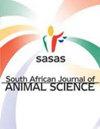Intestinal morphology and mucin composition in Japanese quails fed on olive cake
IF 0.6
4区 农林科学
Q3 AGRICULTURE, DAIRY & ANIMAL SCIENCE
引用次数: 1
Abstract
Olive cake, sometimes also called spent olive, is a low-energy nutrition source. It possesses various biological properties that are antioxidant, anti-inflammatory, antimicrobial, and antiviral in property due to its rich polyphenolic compound content. Mucins can be found in the composition of the mucus that cover the surface of the gastrointestinal tract. Feed additives can influence the mucin composition, as well as the height and width of the villi, which are biological appendages tasked to increase the absorption surface in the small intestinal mucosa. The aim of the present study was to determine the histology of the small intestine in Japanese quails fed with olive cake. In the study, mixed-sex quails fed with rations containing different amounts of olive cake were used as the live material. Morphological measurements, Alcian blue/periodic acid–Schiff, and aldehyde fuchsin/Alcian blue histochemical stains were performed on stomach and small intestine tissues taken from quails. Significant increases in villus height, villus width, and crypt depth in duodenum, jejunum, and ileal tissues were determined in control and experimental groups. The increase in crypt depth was greatest in the ileum. In the jejunal tissue, it was determined that the width of the villus decreased in groups 1 and 2 but increased in group 3. In the histochemical evaluation, it was determined that sulphate mucins were intense in the proventriculus, while carboxylic mucins were intense in all three parts of the small intestine. Considering the physiological functions of mucins, olive cake is thought to play an important role in the protection of the mucosa in quails.橄榄饼饲喂日本鹌鹑肠道形态及粘蛋白组成
橄榄蛋糕,有时也被称为废橄榄,是一种低能量的营养来源。由于其含有丰富的多酚类化合物,具有抗氧化、抗炎、抗菌、抗病毒等多种生物学特性。粘蛋白可以在覆盖胃肠道表面的粘液成分中找到。饲料添加剂可以影响粘蛋白的组成,以及绒毛的高度和宽度,而绒毛是增加小肠黏膜吸收表面的生物附属物。本研究的目的是确定日本鹌鹑喂食橄榄饼小肠的组织学。本研究以混性鹌鹑为实验对象,饲喂含有不同数量橄榄饼的口粮。对鹌鹑的胃和小肠组织进行形态学测定、阿利新蓝/周期性酸-希夫染色和醛紫红/阿利新蓝组织化学染色。对照组和试验组十二指肠、空肠和回肠组织的绒毛高度、绒毛宽度和隐窝深度均显著增加。隐窝深度的增加在回肠最大。在空肠组织中,1组和2组绒毛宽度减小,而3组绒毛宽度增大。在组织化学评价中,确定硫酸盐粘蛋白在前心室强烈,而羧酸粘蛋白在小肠的三个部分都强烈。考虑到粘蛋白的生理功能,橄榄饼被认为对鹌鹑的粘膜具有重要的保护作用。
本文章由计算机程序翻译,如有差异,请以英文原文为准。
求助全文
约1分钟内获得全文
求助全文
来源期刊

South African Journal of Animal Science
农林科学-奶制品与动物科学
CiteScore
1.50
自引率
0.00%
发文量
39
审稿时长
>36 weeks
期刊介绍:
The South African Journal of Animal Science is an open access, peer-reviewed journal for
publication of original scientific articles and reviews in the field of animal science. The journal
publishes reports of research dealing with production of farmed animal species (cattle, sheep,
goats, pigs, horses, poultry and ostriches), as well as pertinent aspects of research on aquatic
and wildlife species. Disciplines covered nutrition, genetics, physiology, and production
systems. Systematic research on animal products, behaviour, and welfare are also invited.
Rigorous testing of well-specified hypotheses is expected.
 求助内容:
求助内容: 应助结果提醒方式:
应助结果提醒方式:


